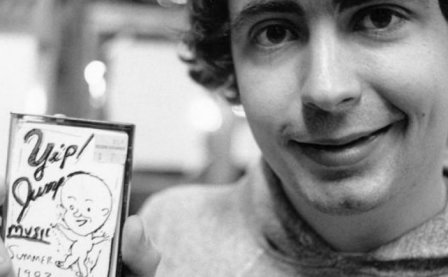For a guy who’s suffered a whole lot of mistreatment, the frequent comparisons to Brian Wilson have got to be one of the heavier burdens placed on Daniel Johnston in recent years. As Tiny Mix Taper Jeff Roesgen said in his review of last year’s Is And Always Was, many critics see Johnston and the erstwhile Beach Boys mastermind as kindred spirits (an idea the must-see documentary The Devil and Daniel Johnston fully embraces), despite the fact that the music of each could be seen as polar opposites. Wilson often needed lyrical translators to help him get his message across, employing entire orchestras and the best recording equipment of the day to craft his lush pop masterpieces; Johnston, for his part, made his most beloved recordings alone, in single takes, using nothing more than a tape recorder and whatever cheap instrument was at hand. To paraphrase Roesgen, the only common ground they ostensibly share is as pop prodigies who struggled immensely to overcome crippling mental illness.
That said, during my first listen through Beam Me Up!, I couldn’t help but think of Wilson’s 2004 version of SMiLE, the long-lost Beach Boys magnum opus. Not due to stylistic similarities (there are none) or quality (talk about unfair comparisons!), but because in both cases it feels like the artist is tying up a loose end. Despite featuring a couple new songs, Beam Me Up! largely finds Johnston collaborating with the 11-piece BEAM Orchestra to flesh out old and familiar tunes cherry-picked from his three-decade career. And while it’s not quite as triumphant as Wilson’s unlikely completion of the woulda-been greatest record of all time, there’s something touching about hearing Johnston play some of his classic bedroom sketches in such a thoroughly arranged and well-produced environment. It’d be hard to know exactly what he had in mind when he was recording his cassette albums back in the 80s, but given the guy’s undying love for Beatles records, chances are Johnston’s ambitions didn’t end at cheap guitars and a chord organ.
The results on Beam are charming and illuminative, as though the spare negatives of Johnston’s old stock have been blown into full-color, oversize prints. The piano pop of “Wicked World” winds up sounding like a jazzy romp on the Yellow Submarine, while the barebones introspection of “Try To Love” here blooms into an orchestral, redemptive epic. BEAM multiply the runtime and musical palette of 1990’s gorgeous minute-long a capella “Devil Town,” making for what might well be the song’s best performance. “Love Enchanted” shows more of its influence than ever before (“Hotel California,” apparently), while “The Beatles” trades a bit of its blatant Jackson 5 melody-griftin’ for the Motown flair that eluded Johnston back on 1983’s Yip/Jump Music. The only sore thumb is “Must,” an ethereal spook from the 2003 Mark Linkous collaboration Fear Yourself, which is dragged down to earth here thanks to a bloating dollop of James Bond theme song bombast. The stone cold classic “Walking The Cow” doesn’t quite work either, compressing too much of the original cut’s melodic space for an energetic shift in tempo — but it’s a strong enough song that a bit of its magic remains.
Another place where Beam resembles SMiLE is the change in voice that time imposes. Unintentionally but inevitably, the tenor of Wilson’s “teenage symphony to God” shifted when it wound up being sung by his gruff and weathered 60-year-old self, giving the long-overdue record a disquieting quality that identified it for what it is: the faded echo of a dream long gone. And while he never had the angelic pipes Wilson did back in his prime, Johnston’s own bout with drugs (past tense) and smokes (ongoing, as the cover art attests) have done him no favors — the lisps and melodic struggles here show a decline from even just half a decade ago. And while Wilson’s harmony-heavy arrangements allowed him to hide a bit behind his chords of young and able acolytes, the bravery in Johnston’s heartfelt (and often challenging) performance is boldly announced from the get-go, with the solo a capella opener “Sarah Drove Around in Her Car.”
Fortunately, this damaged voice of Johnston’s plays into one of his greatest strengths as a songwriter: unabashed, heartbreaking sincerity. His long-unrequited and utterly helpless love for his college crush Laurie has inspired countless songs, and here his greatest tribute to her, “True Love Will Find You In The End,” becomes more moving than it’s ever been. Singing the title lyric, his cracked old voice soothed by a warm sunset of horns, you have to wonder whether or not he really believes in those words anymore — and would it be sadder if he did or didn’t?
Johnston himself offers a hint in one of the record’s few new tunes, “Last Song,” which acknowledges the passage of time with a reference to his own famous ‘unfinished album’ in its opening lyric: “Hi, how are you, these days?” The minor-key, lo-fi ode to self-deprecation and failure doesn’t seem to speak too well for Johnston himself. And as for true love, he still longs for a girl with audible pain — “or even a whore,” he adds with bitter resignation. Which makes Beam, in a sense, not just a record about returning to past hopes and dreams, but also one about how that same old ambition can never quite be reclaimed no matter how much you try. Sounds like SMiLE to me.
More about: Daniel Johnston




